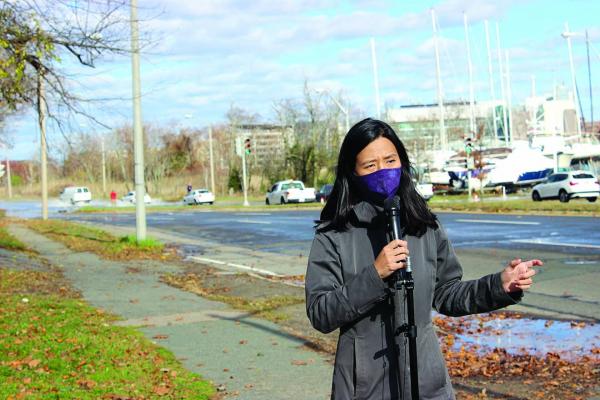November 18, 2020

Boston City Councillor-at-Large Michelle Wu spoke about climate resiliency on Monday morning as she stood along Morrissey Boulevard, which was partially closed as a King Tide inundated the roadway. Katie Trojano photo
Activists joined at-large City Councillor Michelle Wu on Monday on the edge of a flooded-out Morrissey Boulevard to press for her version of a climate resiliency plan that she has dubbed the Boston Green New Deal. Wu, who has announced that she is running for mayor in next year’s municipal election, used the backdrop of the inundated, state-owned roadway on an otherwise sunny day to argue that more urgency is needed for the city to adjust to climate change.
At one point, she waded across a flooded section of the boulevard, which was closed to southbound traffic during a strong tidal surge, to address reporters.
“I’m here with a group of leaders and climate activists to mark what will be an increasingly frequent sight in our city,” said Wu, “the regular flooding on a beautiful sunny day from sea levels going up and up. “Time it just a little bit different, match it with higher winds, rain, or a storm, and we will see flooding threatening our neighborhoods all the way into Dorchester and throughout the city.”
She referenced a policy paper that she released last August that, she said, would accelerate Boston’s timeline for carbon neutrality to 2040. It also sets up intermediate steps, including 100 percent renewable electricity by 2030, and a net zero city municipal footprint by 2024.
“We cannot wait to retrofit every building that’s going to be built in these next couple of years and try to catch up,” she said. “The harms are already here and we need strong actions and plans that center our most impacted communities. We need to take action now at the city level, even before the federal government switches over.”
Wu’s press conference came a few hours after Climate Mayors, a group of 468 US mayors working on climate change, named Mayor Walsh the new chairman of their coalition. He trumpeted the position in a statement on Monday.
“As mayors, we’re close to the people we serve,” he said. “We see how climate change is already impacting the residents in our cities, and we know how important it is for us to take decisive action for the sake of public safety and public health.”
He added, “American cities have led on climate action for a long time, and especially over the last four years. As we welcome in a federal administration committed to urgent, bold climate policies, the Climate Mayors are looking forward to accelerating our efforts.”
Watch: Mayor Walsh discusses role with Climate Mayors
Walsh succeeds Los Angeles Mayor Eric Garcetti, who founded the coalition. In June 2018, Walsh hosted the International Climate Mayors Summit.
Earlier this month, the Walsh administration issued a 174-page report outlining how Boston intends to shore up coastal protections and re-imagine development along Dorchester’s waterfront as sea levels continue to rise.
The report - called “Coastal Resilience Solutions for Dorchester” – is a summary of the Climate Ready Dorchester initiative. According to Walsh, it also acts as a “roadmap for near- and long-term solutions to help make Dorchester more resilient for many years to come.”
The report notes that its main objective is the creation of a series of “risk reduction solutions for coastal flooding and rising sea levels” projected out to 2070. The outlined solutions – from elevated roadways and flood gates to other measures – make assumptions based on scientific models that project a dramatic rise in sea level as high as 9 inches in the next decade and up to 40 inches over the next 40 years.
Morrissey Boulevard is featured prominently in the Walsh plan, but like many assets in proximity to the coast, the roadway is controlled by the Commonwealth of Massachusetts, not the city.
A planning effort aimed at shoring up the boulevard and adding modern safety features for pedestrians and bicyclists — led by the state’s Dept. of Conservation and Recreation— has been stuck in neutral since the most recent community meetings and comment period on the topic ended in December 2017.
Heather O’Brien, an activist with the Boston Harbor Storm Surge Working Group who joined Wu on Monday, noted that the state plan for Morrissey seems stalled.
“We don’t really need to see any more studies to see that it floods. It does flood. And we really need to start doing something about it,” she said.
The Reporter asked the DCR this week for an update on the Morrissey project— and whether the agency intends to revive its planning and community engagement efforts. In a written response, an agency spokesperson summarized the DCR’s past efforts to bring the estimated $87 million project to a 25 percent design phase, but included no information about what future steps are planned to finalize the design or to implement it.


